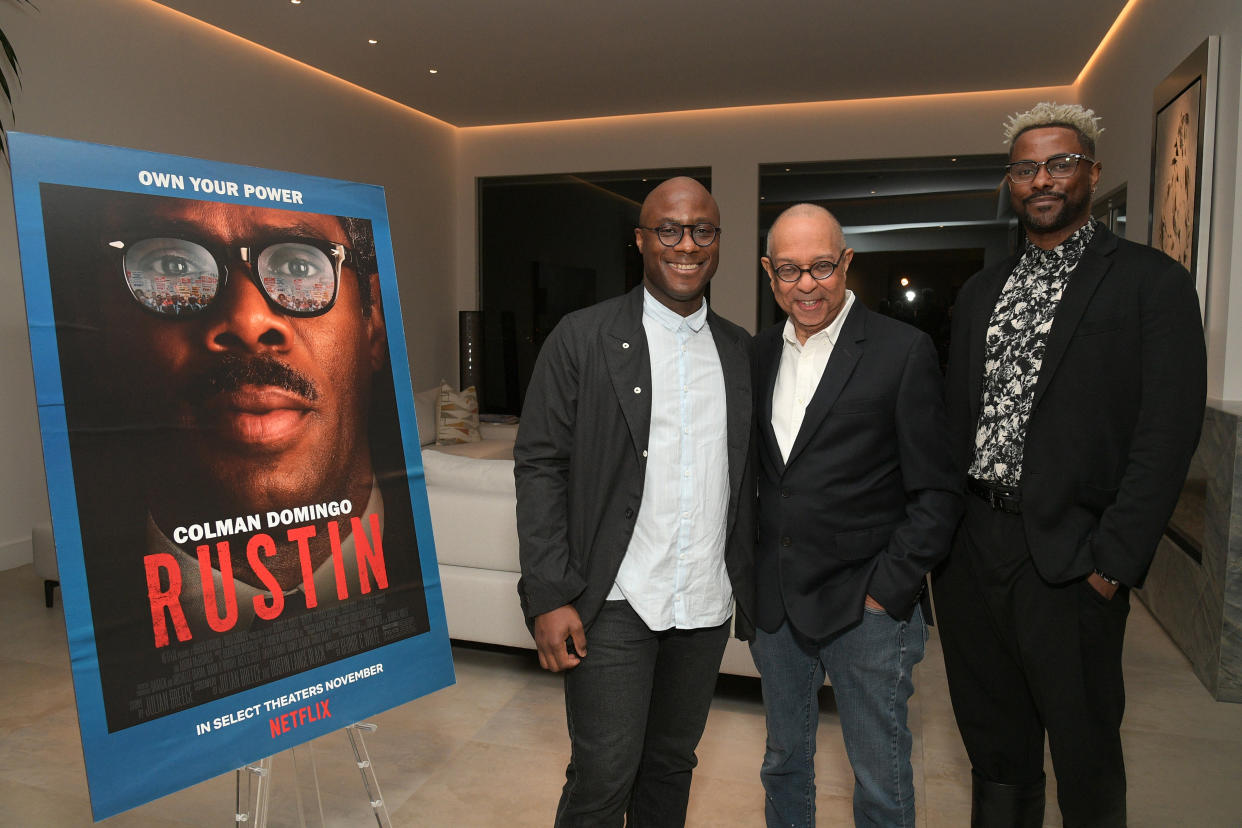Barry Jenkins Praises George C. Wolfe’s ‘Rustin’: ‘I Sat Up in My Chair and Just Started Crying’

- Oops!Something went wrong.Please try again later.
- Oops!Something went wrong.Please try again later.
March on Washington organizer Bayard Rustin, a Black and gay civil rights advocate who died in 1987 after decades of fighting for peace, nonviolence, and racial equality in the workplace, gets a rousing spotlight in playwright-turned-filmmaker George C. Wolfe’s “Rustin.” The Netflix drama, in theaters now and streaming on the platform November 17, stars Colman Domingo in the title role, and it’s one of this year’s awards contenders to watch. Barack and Michelle Obama back the film through their Higher Ground productions, making an appearance this past weekend to support the biopic. Julian Breece and Dustin Lance Black co-write the screenplay, which centers on Rustin’s 1963 March on Washington for Jobs and Freedom.
Recently, none other than Oscar-winning “Moonlight” director Barry Jenkins moderated a Q&A with Wolfe and Breece at Ross House in Los Angeles on November 6. “I watched the movie, and when it ended, I sat up in my chair and just started crying. I couldn’t understand why I was crying,” Jenkins said. “Something about it just moves me uncontrollably. I think of my ancestors all the time as these titans who are just up on this mountain. Seeing them as kids, especially in addition to this wonderful man and generation ahead of them, empowering them to take back, to really grow and empower, is really moving.”
More from IndieWire
“It was this astonishing human being and the ferocity of his commitment and the passion he took on everything,” Wolfe said of why he was drawn to Bayard’s story. “During World War II, he was in prison because he was a conscientious objector. He protested the internment of the Japanese. He was a Freedom Rider before the term ‘Freedom Rider’ even existed. Every single step of the way. When he was growing up in Westchester, Pennsylvania, which had been a stop on the Underground Railroad … it became very segregated, so when he was 14, 15, leading protests about segregated facilities. He was a star athlete. He appeared on Broadway in performances of a play starring Paul Robeson. He was in the chorus. It’s just like, what don’t you do? … He devoted himself to a life of service and a life of empowerment.”
“I learned about Bayard Rustin when I was in high school, but not in my high school classes because his name does not appear in any of his textbooks,” said Breece. “I was around 13, and I was really coming to terms with my sexuality, that this gay thing was going to stick, and as any other millennial looking for things they’re not supposed to find, I found Bayad on the internet in my parents’ basement. And I remember it was a guy, Keith Boykin, he had a blog. He was a Black gay activist at the time, one of the few who had a presence online then, and he would post these biographies of queer Black people … one of them was Bayard. I was so taken by Bayard.”
Breece said seeing Bayard in a photo next to Martin Luther King Jr. inspired him at the time as a gay Black kid. “I’m still feeling very alone in my environment. I didn’t have any examples of gay Black men in my life. For me, Bayard, seeing him stand next to Martin Luther King, the most iconic religious leader in modern history, blew my mind, and it stayed with me… When this opportunity [to write ‘Rustin’] came along, I was like, ‘me!'”
Read IndieWire’s interview with Wolfe out of Telluride here.
Best of IndieWire
The Best LGBTQ Movies and TV Shows Streaming on Netflix Right Now
Guillermo del Toro's Favorite Movies: 54 Films the Director Wants You to See
Nicolas Winding Refn's Favorite Films: 37 Movies the Director Wants You to See
Sign up for Indiewire's Newsletter. For the latest news, follow us on Facebook, Twitter, and Instagram.

